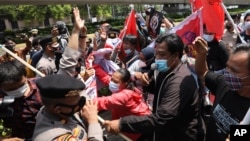Southeast Asia’s powerful negotiating bloc has ignored pressure to chase Myanmar over violence and suspected human rights problems, ensuring that a negative spotlight does not turn on other members or threaten the group’s prized neutrality, analysts believe.
They say any public condemnation of Myanmar’s junta government, which took power in a February 1 coup, or the threat of action against it would expose at least five other Association of Southeast Asian Nations (ASEAN) members to scrutiny over human rights issues as perceived by critics in the West.
“If ASEAN violates and crosses the line by passing judgments on each other’s internal affairs, this would be slippery because most ASEAN governments have skeletons in the closet,” said Thitinan Pongsudhirak, a political science professor at Chulalongkorn University in Bangkok.
Bloc members Cambodia, Laos, Thailand, Vietnam and the Philippines have been accused of mishandling human rights and civil liberties over the years.
As of Tuesday, 841 civilians have been killed and 5,576 arrested in Myanmar since the February 1 coup, the advocacy group Assistance Association for Political Prisoners says. The junta took over after popular elections in November signaled consolidation of the country’s decade-old, pro-democracy reforms. The military ruled Myanmar, also known as Burma, before 2011.
Myanmar border nations Bangladesh and China have urged ASEAN to act, while the United Nations has proposed an embargo on arms sold to Myanmar despite protests from ASEAN member countries.
ASEAN’s Jakarta-based secretariat did not answer a request this week for comment on the Myanmar issue. However, leaders from the bloc are expected to visit the country this week to discuss developments, according to reports. ASEAN membership, which includes Myanmar, has a non-interference policy amongst member states.
Non-intervention outlook
ASEAN, with 10 members spanning a population of about 660 million, traditionally avoids interfering in the domestic affairs of any single country and prides itself as a bloc focused on helping all members get ahead via trade, cross-border travel and anti-COVID-19 measures. Many of the 10 member nations have deep disagreements with one another that do not surface at formal ASEAN events.
The Southeast Asian group lacks the power of other regional blocs, such as the Economic Community of West African States, said Oh Ei Sun, senior fellow with the Singapore Institute of International Affairs. ECOWAS responds to coups by suspending member countries and imposing sanctions.
Country by country
Democratic nations in the bloc, particularly Indonesia, have put pressure on Myanmar individually, especially as more problems there could spark an outflow of refugees. Some among the Muslim Rohingya population that has sparred with Myanmar’s government for decades have already fled to Malaysia and Indonesia.
“I think Indonesia as the largest, most powerful, most populous country in Southeast Asia, it is in a sense trying to play a more commensurate role to its size and power,” Oh said.
Singapore Foreign Minister Vivian Balakrishnan in March called Myanmar’s unrest “an unfolding tragedy" and said other Southeast Asian countries need to develop a response.
Refugee crisis feared
If Myanmar “sinks into a civil war-like situation” and violence escalates, ASEAN will feel more pressured to act so the region avoids a refugee crisis, said Alexander Vuving, a professor at the Daniel K. Inouye Asia-Pacific Center for Security Studies in Hawaii.
ASEAN’s strength — and only option — would be talks, experts say. The bloc regularly pulls in China, Japan and the United States for talks on other issues. “If violence stays high or increases, ASEAN will be less patient, but ASEAN, because it’s working on the principle of consensus, doesn’t have a better alternative than just dialogue,” Vuving said.
ASEAN could draw on its strength in “convening” countries in pairs or in bigger groups including non-members, said Priscilla Clapp, former permanent charge d’affaires at the U.S. Embassy in Myanmar.
Myanmar unfazed
Myanmar for its part could seek support from Asia’s most powerful nation China if it came under too much criticism, Thitinan said. China is not an ASEAN member and some existing members, such as Vietnam and the Philippines, have their own disputes with Beijing. China and Myanmar historically have close ties despite friction over Chinese investments in the Southeast Asian country.
Myanmar’s coup leaders are probably paying little attention to ASEAN’s dilemma, Clapp said. They are “wrapped up in an alternative universe,” she said, and the military leader Min Aung Hlaing has “surrounded himself with yes men.”
“He’s confident in no intervention by ASEAN,” Clapp said.




